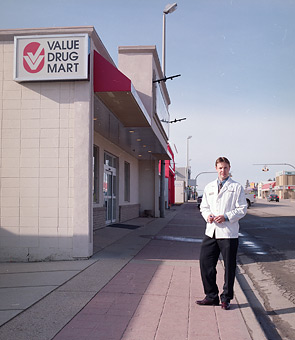
Patrick Rurka, owner of Value Drug Mart in Rimbey, Alberta, Canada.
Patrick Rurka's business should be struggling. He owns and manages an independent Value Drug Mart store in rural Rimbey, Alta. (pop. 2,100). He competes with a big regional chain store that offers conveniences like Sunday hours. Rurka stays closed on Sundays--unless a customer calls him with a medication emergency and meets him at the back door for a prescription refill.
But Rurka, a 32-year-old pharmacist, is thriving. Sales have grown 10% each year since he bought the store in 2004. He draws a comfortable salary to support his wife and children. And he's on track to pay off his debt on the business, including a comprehensive renovation, by 2014. "I'm getting exactly what I want out of life," Rurka says. He hopes to buy another Value Drug Mart store in a few years.
Rurka is not alone. Four other rural Value Drug Mart stores have been sold to young Albertan entrepreneurs since 2004. In each case, despite minuscule collateral and a cautious lending environment, pharmacists with big dreams have secured financing in excess of $1 million. In the process, they're building what could be a promising model for helping Canada sustain legions of potentially vulnerable mom-and-pop businesses.
Data suggest that mom and pop are getting ready to sell. Across Canada, 1 out of 3 independent-business owners plans to retire within the next five years, and 2 out of 3 plan to quit within 10, according to a 2006 survey by the Canadian Federation of Independent Business (CFIB). Young entrepreneurs would often like to take over but can come up with neither the cash nor the financing, according to Dan Kelly, a lobbyist for the CFIB.
Finding an exit strategy is a "massive issue for business owners," says Carole Spooner, director of succession services for Meyer Norris Penny, a Canadian business-advisory firm. "The number of business owners that are looking to exit their business is extremely high," Kelly says, "so I think models that can help smooth that transition would be very well thought of."
As a developed country like Canada ages and succession challenges loom large, pharmacists are pioneering a solution through a program called Value Invest. It grows out of Value Drug Mart Associates Ltd. (VDMA), a cooperative formed 29 years ago to cut out middlemen and enable independent drugstore owners to survive amid mounting competition from corporate chains. Today VDMA enables its 41 pharmacist owners to remain viable by keeping costs down, but the system will implode if 10 or more of those owners liquidate or sell their stores to a corporate chain.
Enter Value Invest. With funds from about 70 investors, most of whom have personal ties to VDMA, Value Invest makes competitive offers when an owner wants to sell. After Value Invest buys a store, it sells it with financing to a young pharmacist, who gets a renovation and a wealth of consulting services. Investors expect and are getting an annual return of at least 10%.
Retiring pharmacists love the program. Laurie Tkachuk, who mentored Rurka, says he got as much from VDMA for his Drayton Valley store as a corporate chain had offered. Now he has poured some of the proceeds into Value Invest, and he sleeps well knowing the new owners were well trained. "The two young fellows had been working here for a couple of years, and of course they wanted to own their own business, and I wanted to get out," Tkachuk says. "It was just a wonderful fit."
Value Invest still faces an uncertain future. A core investor pool has generated the bulk of Value Invest's $11 million so far, but that group may not have much more to invest, according to Al Hodgins, CEO of Value Invest. To raise capital, Value Invest could possibly reorganize as a publicly traded company, Hodgins says. But in the meantime, the group's lawyers have another idea: patent and license the system, so other industries--across Canada and abroad--can pass their independent businesses on to a rising generation of entrepreneurs. "We know we have a good thing," Hodgins says. "It's just a question of how to bottle it."